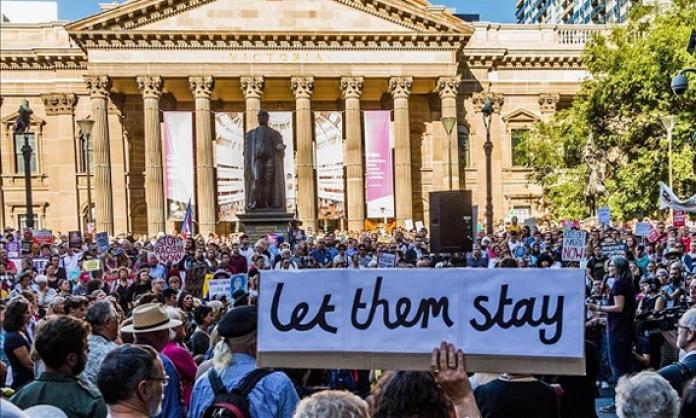The High Court has ruled that Australia’s internment camps on Nauru and Manus Island are constitutional. Two hundred and sixty-seven asylum seekers, including 37 babies, now face imminent deportation back to these hell holes.
But while the judges have given their seal of approval to offshore processing, to a regime designed to be so cruel that it would deter asylum seekers fleeing murderous violence from Syria to Sri Lanka, the public response has not been one of resignation.
Instead, there has been a wave of outrage and protest. Thousands have participated in snap rallies across the country. The offices of politicians have been targeted for sit-ins, banners unfurled by abseilers over freeways and innumerable protest photos taken in workplaces, all demanding the government #letthemstay.
Some had held out hope the Turnbull government would soften Australia’s brutal refugee policies. This wishful thinking has ended with Turnbull’s stony reiteration, “The critical thing is to maintain the security of the border”.
Immigration Department secretary Mike Pezzullo has indicated the asylum seekers could be deported “within days”. The immediate task is to stop this from happening, and there is a distinct mood for civil disobedience to prevent it.
Immigration Department secretary Mike Pezzullo has indicated the asylum seekers could be deported “within days”. The immediate task is to stop this from happening.
In Brisbane at the Lady Cilento Children’s Hospital, staff are refusing to discharge “baby Asha”, who has been receiving treatment for burns. Despite being born in Australia, she is absurdly considered an “illegal maritime arrival” because her parents sought asylum by boat. Last year, at the age of five months, she was sent to Nauru, to a compound infested with rats and cockroaches, where refugees are housed in damp mouldy tents.
The doctors and nurses are determined not to let this happen again, and hundreds of people have rallied outside the hospital to prevent baby Asha from being snatched by Border Force agents.
The Australian government considers it a criminal act for workers in the detention system to speak out against systemic human rights abuses. The Border Force Act threatens them with a two-year jail sentence. But they are refusing to be silent. Instead, health workers are turning this act into a dead letter with their constant heartbreaking accounts of broken young minds and bodies in detention.
Particularly powerful has been the offer of sanctuary by churches. They have invoked a historical tradition of providing safety and protection to victims of state-sanctioned abuse. Leading the way has been reverend Peter Catt, the Anglican dean of Brisbane. Speaking to media, he said returning asylum seekers to Nauru “fundamentally goes against our faith, so our church community is compelled to act, despite the possibility of individual penalty against us”.
Mosques in Queensland backed his stand. In a widely signed statement they declared, “[T]he Muslim community will not only support but join in by opening Slacks Creek and Logan Mosque to the asylum seekers. Members of the Muslim community will stand hand in hand with our Christian brothers and sisters”.
Perhaps the most unexpected rebellion has been by state premiers. It began with Victorian premier Dan Andrews offering to take “full responsibility” for the children and their families. Hot on his heels were similar commitments from another five state premiers or chief ministers, all scrambling to position themselves as compassionate.
This is the most significant challenge within the Labor Party over its refugee policy. There was barely a ripple inside the party when Julia Gillard reopened Nauru or when Kevin Rudd took us into uncharted viciousness by declaring that no asylum seeker who arrived by boat would ever be resettled in Australia.
Bill Shorten of course is having none of it. He is holding the line on racist cruelty. And no-one in the federal shadow cabinet has backed up the call to let the refugees stay.
Trade unions in particular have a critical role to play in taking this campaign forward. Unions have been endorsing and speaking at refugee rights rallies for years. Countless motions have been passed committing the union movement to oppose forced deportations and mandatory detention. Luke Hilakari, the secretary of Victorian Trades Hall, has echoed the churches’ call for sanctuary.
All of this is an important positive development. But it’s time to turn words into actions. We need unions to commit to using their industrial power. Deportations require the cooperation of workers, more often than not unionised workers – from the staff at hospitals to the airport baggage handlers, pilots and cabin crew who fly asylum seekers restrained in handcuffs back to hell. They should refuse to facilitate the government’s human rights abuses.
This is not unrealistic. Teachers at Brisbane’s Yeronga State High School recently took strike action when a student, Mojgan Shamsalipoor, an Iranian asylum seeker who was only months away from graduating, was forcibly transferred to Darwin detention centre. And the brave stand by workers at Lady Cilento points to the potential to disrupt the machinery of repression.
We also face important political challenges. The prospect of sending babies and children to rot on a prison island where they face physical and sexual abuse has touched a nerve. But the sights of the campaign can’t be narrowed to the demand of getting children out of detention.
No-one should be subject to arbitrary indefinite detention. Not one single baby, child, parent, couple or single person should be forced to endure one more day behind razor wire. More than 900 young men are detained on Manus Island. There two asylum seekers have been murdered, Reza Berati and Hamid Kehazaei. Another, Behnam Satah, the roommate of Reza and witness to his death, lives in fear for his life. We must not abandon them.
Neither can we forget the thousands living in the community on temporary visas who are being destroyed by the fear of being returned to danger.
We need to link up the fight to defend the 267 to a movement that can rip up the entire racist framework of offshore processing and mandatory detention. Until there is justice for all of the refugees, there can be no peace.









